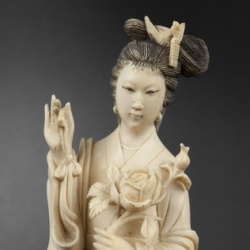Difference between revisions of "Trust"
(Created page with "thumb|250px| <poem> Trust (''saddahati'') is to assume or believe that someone is good, honest and means no harm. The English word comes from Middle English tr...") |
|||
| (3 intermediate revisions by 2 users not shown) | |||
| Line 1: | Line 1: | ||
[[File:3N.jpg|thumb|250px|]] | [[File:3N.jpg|thumb|250px|]] | ||
| − | |||
| − | |||
| − | See Faithfulness | + | |
| − | + | ||
| + | |||
| + | |||
| + | '''[[Trust]]''' (''[[saddahati]]'') is to assume or believe that someone is good, honest and means no harm. | ||
| + | |||
| + | The English [[word]] comes from {{Wiki|Middle English}} trewe and is related to the [[word]] ‘true.’ | ||
| + | |||
| + | To [[trust]] someone is an act of [[generosity]] towards and the greatest [[courtesy]] you can pay them. | ||
| + | |||
| + | [[People]] appreciate being trusted and usually make sure the [[trust]] given them is justified. | ||
| + | |||
| + | To be worthy of [[trust]] requires fidelity to the [[Precepts]]. | ||
| + | |||
| + | When we are trustworthy ourselves and [[trust]] others, we make a genuine and important contribution towards a more [[pleasant]] and harmonious [[society]]. | ||
| + | |||
| + | Because [[trust]] is unburdened by hesitation and [[doubt]] and because it opens us out to certain possibilities, it has an important part to play in {{Wiki|spiritual}} [[development]]. | ||
| + | |||
| + | One type of [[person]] may accept the [[Dhamma]] after [[pondering]] over it with [[wisdom]], which is entirely admirable. | ||
| + | |||
| + | However, that is not the only approach. | ||
| + | |||
| + | Another [[person]] may hear the [[Dhamma]] and simply [[trust]] what they hear. Such [[people]], the [[Buddha]] said, have ‘entered a fixed course of [[rightness]], have entered the plane of the {{Wiki|superior}} [[person]] and transcended the plane of ordinary [[worldly]] [[people]]. | ||
| + | |||
| + | They will not do any [[deed]] that could result in [[rebirth]] in any of the [[lower realms]], and before their [[life]] ends they will attain the first stage of [[enlightenment]].’ (S.III,225). | ||
| + | |||
| + | See [[Faithfulness]] | ||
| + | |||
{{R}} | {{R}} | ||
[http://www.buddhisma2z.com/content.php?id=426 www.buddhisma2z.com] | [http://www.buddhisma2z.com/content.php?id=426 www.buddhisma2z.com] | ||
[[Category:Buddhist Terms]] | [[Category:Buddhist Terms]] | ||
[[Category:Buddhist psychology]] | [[Category:Buddhist psychology]] | ||
Latest revision as of 03:19, 28 February 2016
Trust (saddahati) is to assume or believe that someone is good, honest and means no harm.
The English word comes from Middle English trewe and is related to the word ‘true.’
To trust someone is an act of generosity towards and the greatest courtesy you can pay them.
People appreciate being trusted and usually make sure the trust given them is justified.
To be worthy of trust requires fidelity to the Precepts.
When we are trustworthy ourselves and trust others, we make a genuine and important contribution towards a more pleasant and harmonious society.
Because trust is unburdened by hesitation and doubt and because it opens us out to certain possibilities, it has an important part to play in spiritual development.
One type of person may accept the Dhamma after pondering over it with wisdom, which is entirely admirable.
However, that is not the only approach.
Another person may hear the Dhamma and simply trust what they hear. Such people, the Buddha said, have ‘entered a fixed course of rightness, have entered the plane of the superior person and transcended the plane of ordinary worldly people.
They will not do any deed that could result in rebirth in any of the lower realms, and before their life ends they will attain the first stage of enlightenment.’ (S.III,225).
See Faithfulness
